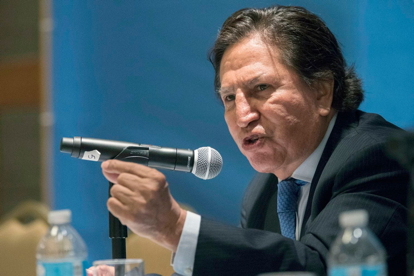
(above) FILE - In this May 24, 2017 file photo, Peru’s former President Alejandro Toledo makes an address at the United Nations in New York. Toledo, who was arrested July 16, 2019, has been kept in solitary confinement and only allowed to go to an exercise yard once in the month he has been in U.S. custody while fighting extradition to his native country to face bribery charges, his defense attorney said in court papers seeking for his release on bail. (Mary Altaffer, File/Associated Press)
Lawyer calls ex-Peruvian president’s US detention ‘inhumane’
August 23, 2019 - Original article: Washington Post (AP)
By Daisy Nguyen | AP
SAN FRANCISCO — Former Peruvian President Alejandro Toledo has been kept in solitary confinement and only allowed to go outdoors once in the month he has been in U.S. custody while fighting extradition to his native country in a corruption case, his defense attorney said.
Federal Public Defender Graham Archer argued in court papers filed this month that Toledo should be released on bail because of “inhumane” conditions at a Northern California federal detention facility.
Toledo is isolated from other inmates because of his high-profile case and has only been allowed to go to an exercise yard once, for 45 minutes, at Santa Rita Jail, according to Archer.
“The prospect of keeping Dr. Toledo, who has never been accused, much less convicted, of any act of violence and, indeed, has not been convicted of any crime at all, in such punitive conditions for what will likely be years of litigation is a special circumstance that verges on the unconscionable,” Archer wrote.
Toledo was arrested July 16 at his San Francisco Bay Area home after the Peruvian government requested his extradition to stand trial on charges of influence peddling and money laundering. The charges stem from allegations that he took $20 million in bribes from Odebrecht, a Brazilian company at the center of Latin America’s biggest corruption scandal.
Toledo, who has denied wrongdoing, was Peru’s president from 2001 to 2006.
Three days after his arrest, Magistrate Judge Thomas Hixson ordered him held, reasoning that if Toledo fled, “this would be a diplomatically significant failure of the United States to live up to its treaty obligations to Peru.
Prosecutors want him held without bond pending extradition proceedings, arguing he is a significant flight risk and that there are no special circumstances to justify his release on bail. They said Toledo’s supposed wealth, including a suitcase stuffed with $40,000 in cash found during his arrest, and his international connections, could propel him to slip out of the country.
In court papers filed Friday, they said Toledo provided no evidence to support that he was suffering from solitary confinement. They also asserted that he has the financial means and motivation to flee, revealing that Toledo and his wife paid more than $6,000 a month to rent a house in Menlo Park and that he tried to renew his Peruvian passport when it was due to expire in June.
The defense countered that Toledo has been aware of the attempt to extradite him since February 2017 and has not tried to flee from California, where they said he lived openly as a permanent legal resident.
His attorneys said Toledo and his wife have run out of money.
“The Toledos were struggling and (his) mother-in-law gave them money to help cover their everyday living expenses,” court papers said in reference to the suitcase with cash.
Having seen their assets seized in Peru, the defense stated, “it is understandable that his wife felt the need to have cash available to pay their bills.”
The defense also argued that he isn’t a flight risk because he has deep ties to the Bay Area.
The revelations marked the latest chapter in what has been a stunning fall from grace for the man who rose out of poverty to become Peru’s first president with indigenous roots.
He grew up shining shoes and selling lottery tickets in northern Peru, one of 16 children, at least seven of whom did not survive to adulthood. His life took an unexpected turn when he met two American Peace Corps volunteers. With their help, he applied for and won a scholarship to the University of San Francisco. He went on to earn graduate degrees at Stanford University.
His jovial nature, ease with the masses and opposition to strongman Alberto Fujimori helped him clinch the presidency in 2001. He proudly called himself “El Cholo” — a term referring to his indigenous ancestry.
After his presidency ended, Toledo returned to Stanford as a visiting scholar and research fellow and was working on a book.
Since his arrest, several friends including four Stanford professors and the former Peace Corps volunteers offered money and property to secure his release from custody.
A bond hearing will be held in Toledo’s case on Aug. 29.
Toledo’s attorney urged Hixson to consider “the diplomatic implications of holding an internationally known political figure for months or even years” in solitary confinement, when he has not been convicted of any crime.
Copyright 2019 The Associated Press. All rights reserved. This material may not be published, broadcast, rewritten or redistributed.